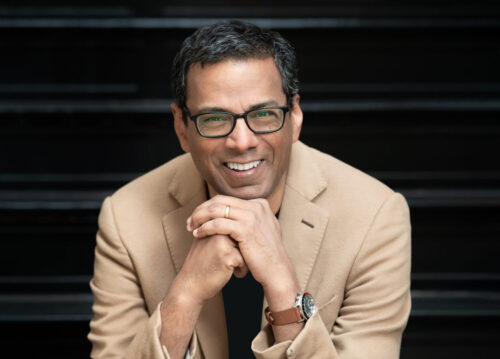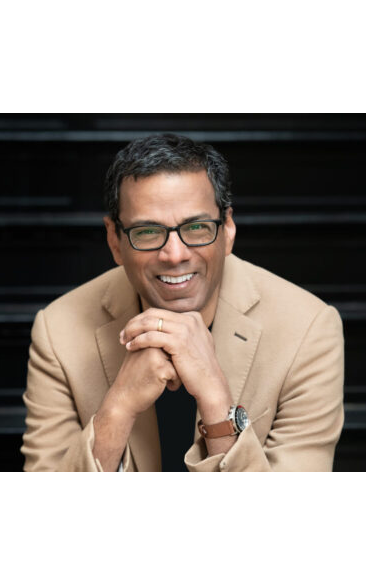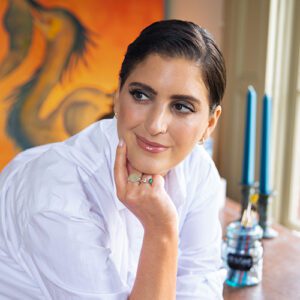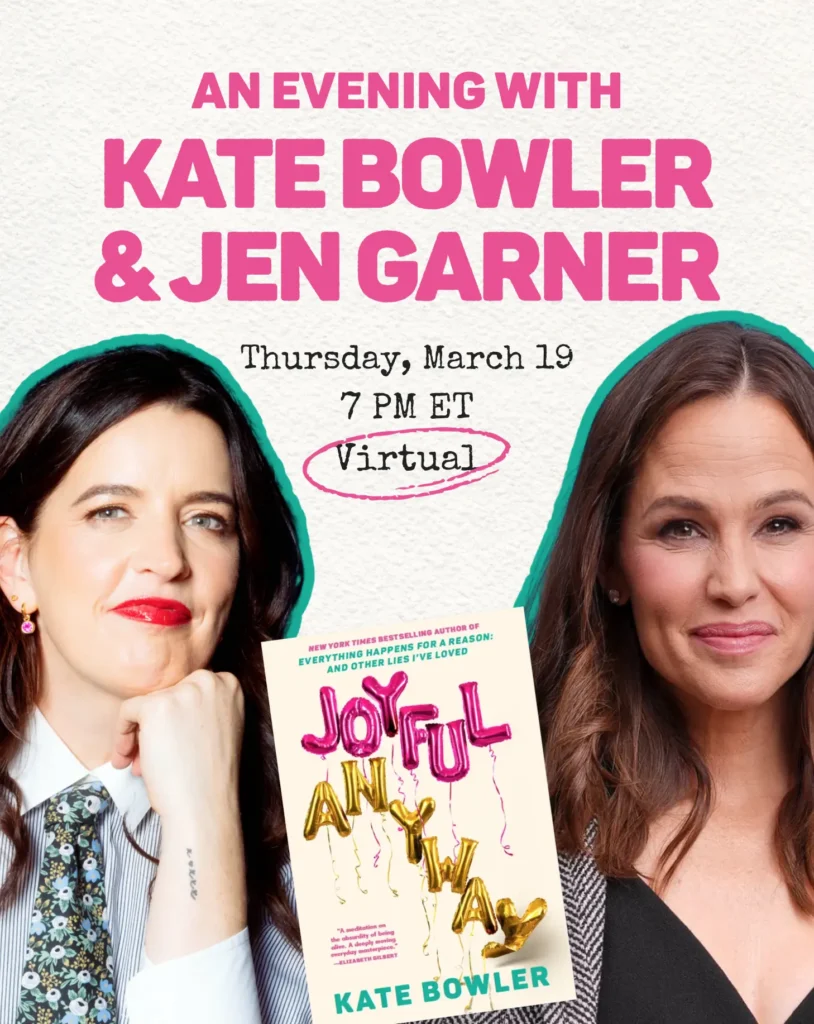Kate Bowler: Everywhere you look, someone is trying to find a cure for being human. Maybe it’s that billionaire chasing immortality using his teenage son’s blood. Or the latest health app pinging you at 2am to say your heartbeat might be irregular. No bother that it just woke you up in the middle of a REM cycle. Also I recently heard about these massage robots I’ve been talking about a lot to my friends. They have heated knuckles. That’s a thing, apparently you have to wear like a space suit, very invested. Look, the future of medicine is wild and underfunded, but underneath all of the innovation, I think we’re asking a more tender question. What does it mean to be cared for? What does a good life look like when healing isn’t guaranteed, when there’s no clear fix? This is Everything Happens, and I’m Kate Bowler. Welcome back. It’s a brand new season of Everything Happens. I’ve missed you. To kick us off, we’re partnered with the Aspen Ideas Festival, a place of high altitude and high-minded ideas. I got to talk with someone I have admired basically forever, Dr. Atul Gawande. Dr. Gawande is a brilliant surgeon and amazing writer and a public health leader who understands better than most how to sit with the fragility of life without turning away. Most recently, he served as the Assistant Administrator for Global Health at USAID. He’s been a practicing surgeon at Brigham and Women’s Hospital, as well as a professor at Harvard Medical School. You probably know him for his book, Being Mortal. And that book changed how I thought about illness and care and what we really owe each other when we face uncertainty. Atul and I talked about so many things, big and small, existential and ridiculous. We talked about what doctors miss, what patients wish they could say out loud, why the best medical advice sometimes sounds a lot like how much ice cream would still make life meaningful. So if you’ve ever wondered how to live when the fixes run out or what it means to feel truly cared for, this one is for you. Welcome, thank you for doing this with me.
Atul Gawande: I’m very glad to be here.
Kate Bowler: I wonder if I could bring you back to Being Mortal, because I have really thought about that book so much since I met you. You captured the tension between medicine’s desire to cure and the hard limitation of human finitude. How do you see that conflict playing out in modern medicine?
Atul Gawande: Well, I mean, it played out in me, right? I loved surgery. I became primarily a cancer surgeon and I loved being able to go in, join with people in difficult moments, need to solve a problem for them and fix it. And I fixed a lot of people, but I did not really recognize how much of my practice was going to be about working with people on problems that we weren’t going to be able to fix—terminal illnesses, serious illnesses where major impairments would be an outcome, uncertain illnesses, and chronic diseases. It was really a combination of feeling incompetent over and over again—what does it mean for me to be a good doctor? And then also what does it mean to be a good son as my dad navigated, also a surgeon, a tumor in his brainstem and spinal cord that would take his life. I talked to more than 200 families and patients who were dealing with often terminal conditions, and then scores of experts, and started to understand what it really does mean to be competent and eventually feel really effective in these spaces.
Kate Bowler: And feeling competent, it sounds like, is having a higher capacity for uncertainty in the moment after you can’t be the person coming into the room with a solution.
Atul Gawande: It really boiled down to a very simple thing that I wish I’d understood from the beginning. Everybody has priorities in their lives besides just living longer. Those priorities are different from person to person, and they change over time. Your most effective way to learn people’s priorities is to ask them, and we don’t ask. I’d say less than a quarter of the time, clinicians or families ask, “What are your priorities besides a bit of living longer?” When you don’t ask, your caregiving is often out of alignment with what matters most to people, and the result is suffering. It’s not as simple as saying, “What matters to you?” You have to have the right kind of conversation. There was a palliative care doctor named Susan Block who really helped me frame this. She pointed out that basic conversations have a couple of key points. Number one: ask what’s your understanding of where you are with your crisis or health. Then ask questions like, “What are your hopes and fears if it gets worse? What are you willing to sacrifice and what are you not willing to sacrifice for the sake of more time? What’s the minimum quality of life you’d find acceptable?” She told me about taking care of her own father. He said, “If I can eat chocolate ice cream and watch football on television, that’d be good enough for me.” That was the best living will ever. Not “Do I want chest compressions?”—just, what makes life worth living? My dad heard that and said, “No way is that good enough for me,” and then we were off to the races. Life’s priorities change over time, especially as illness progresses. My father had to navigate a new identity as a surgeon he could no longer operate, and figure out what actually made life worth living.
Kate Bowler: What is the space after just outcomes language? I usually felt very lonely after a doctor’s appointment when I realized I knew a lot about intended outcomes, my drugs, side effects, but I didn’t have that little space to say, “I’m just worried my hands are too tender to play with my kid.”
Atul Gawande: That’s so much a part of it. For you, it wasn’t chocolate ice cream and football. It was, for example, a patient who just wanted to hope she could hold her child during chemotherapy. Physicians are very uncomfortable having conversations about risk tolerance and trade-offs. My mother developed ovarian cancer at 88. We tested training half the staff in these conversations and saw that those staff aligned care with patients’ goals, lowered anxiety, and cut depression by half at end of life. Choosing staff trained in goal-oriented care mattered. My mother decided on a compromise in chemotherapy that balanced treatment and side effects—this was the risk she was willing to take. She got lucky—four years later, she’s cancer-free.
Kate Bowler: There’s something deeply soulful about hearing people make these tiny decisions about what makes them feel fully human. Nursing homes could implement inexpensive interventions that make people feel more human.
Atul Gawande: That led to the Greenhouses concept. Everyone in the community is asked to care for something alive—a plant, a parakeet, a cat. Staff participate in care. Residents feel purpose and belonging. This expanded into contributing and taking risks, like the woman with disabling arthritis who had to leave her home. Having privacy and purpose became her minimal quality of life.
Kate Bowler: There’s something strange about the volume setting of our pain—it goes down when we start caring for other things.
Atul Gawande: Responsibility and trust make a difference. You take risks, you have purpose. I hadn’t thought of it, but it’s true.
Kate Bowler: I was at the lemur center at Duke University. Lemurs are endangered. They have to move them to North Carolina. I wondered: what’s the best outcome for lemurs? Having more lemurs survive. But everybody—including lemurs—is miserable if we can’t take risks. Without risk, the volume of our own anxieties escalates.
Atul Gawande: This becomes family conflict. Grandpa won’t care for himself. You debate risk tolerance, independence, and quality of life. It’s an ongoing conversation.
Kate Bowler: I always think of you as the most human doctor. Right now, healthcare is renegotiating what it means to be human. I saw a massage robot with heated knuckles, and I wondered what hands are for. AI innovators debate the future of medicine, but are they asking what it means to be human?
Atul Gawande: Healing isn’t just diagnosis and treatment. AI gives probabilities: this treatment works, this might be the diagnosis. What do you do with probabilities? My wife had low sodium. Do you rush to test for adrenal problems, or wait three months? Clinician judgment matters, as does relationship and understanding goals. AI can’t replace human touch or personal connection.
Kate Bowler: It forces you into choices based on values. Some people spend billions trying to extend life dramatically—like someone getting blood from his son. You’ve been pro-limitation, pro-mortality. What’s wrong with us?
Atul Gawande: George Saunders and I talked about this. If you could live 800 years, would you? I’m not anti-forever, but we’ve improved life expectancy in high-income countries to 90 on average. That’s public health and medical care, not magic elixirs. Max lifespan hasn’t changed; oldest person is ~118–120.
Kate Bowler: We’ll take a break to hear from sponsors.
Atul Gawande: At USAID, I led global health across 65 countries. Medical innovation, even $300 per person per year, lifted life expectancy in Costa Rica to 82, nearly matching US. In Thailand, death rates dropped similarly. This is community-based primary healthcare: assigned teams, essential medicines, home visits, outreach. Primary care works.
Kate Bowler: My friend Ari Johnson called it the violence of delay.
Atul Gawande: The US has weak primary care. People wait until crisis. Community nurses and health workers dramatically improve outcomes—especially younger people, connecting them to the system. We did that during COVID with vaccination.
Kate Bowler: Tell me about USAID’s scope.
Atul Gawande: Amazing job—best in medicine you’ve never heard of. 2,500 people in 65 countries, $24 per American per year, saving millions of lives. Focus on biggest killers. Today, the programs are decimated, causing massive preventable deaths. Malnutrition alone: 60,000 deaths from diarrhea and pneumonia.
Kate Bowler: How do people stay attuned?
Atul Gawande: Bear witness. Understand reality. Have kitchen-table conversations. Call your representatives. Build trust. Interact with people around you. Globally, private charities help but large government support is critical. Knowledge and trust matter.
Kate Bowler: Last question: joy. What brings you joy right now?
Atul Gawande: Crisis situations give me purpose. Not in the OR, but primary care and system improvements are my joy—making a tangible difference.
Kate Bowler: You make me want to be a purpose machine, Atul. Witnessing this is essential. Thank you. Your work reminds us mortality is to be honored, not solved. Live on purpose. Blessings to those deeply human, with pill organizers, hopes, laughter, and risks. May your quality of life include snacks, naps, and someone who asks the right questions. More reflections at KateBoehler.substack.com and YouTube at Kate C. Boehlar. Everything Happens is a group project with an incredible team. Thank you to Aspen Ideas Health. This is Everything Happens with me, Kate Bowler.

















Leave a Reply